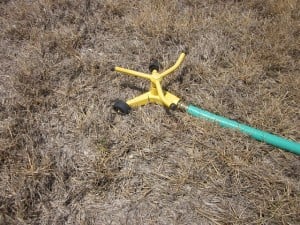 The third consecutive year of drought plaguing California has encouraged unprecedented legislative and regulatory efforts to conserve what limited water the state has in its supply.
The third consecutive year of drought plaguing California has encouraged unprecedented legislative and regulatory efforts to conserve what limited water the state has in its supply.
Come Tuesday, state officials from the State Water Resources Control Board will meet to discuss plans to impose emergency and temporary water conservation rules and regulations on outdoor water usage, an area state officials view as posing great potential for preserving the coveted liquid.
If passed, the new rules could include a $500 daily maximum fine for “water hogs” and violators, according to the San Francisco Chronicle.
Prohibited activities could include using water to wash down hard surfaces such a driveways and sidewalks; using landscaping water to the point where it would result in runoff, and the washing of vehicles unless the hose has a shut-off nozzle which controls water output.
Flushable toilets at popular state parks such as D.L. Bliss State Park at Lake Tahoe, the Hearst Castle Visitor’s Center, and Hearst San Simeon State Park have been shut down and replaced with portable toilets, according to the Associated Press. Additionally, showers at D.L. Bliss, San Simeon and Portola Redwoods State Parks have also been shut down in an effort to conserve water.
The AP notes that the officials have said the remaining water supply must be preserved for portable water at”This is not about aesthetics,” Gordon said, “as much as public health.” campsites and firefighting.
In San Francisco, city officials have raised concerns over the need to use water to wash off human fecal matter and urine from sidewalks. “We give very high priority to responding to the pee and poop requests,” said Public Works Department spokeswoman Rachel Gordon. This past year alone, San Francisco had 16,164 reports of streets and sidewalks in need of cleaning, the bulk of which concerned human waste, reports the Chronicle.
“This is not about aesthetics…as much as public health,” Gordon said, expressing that city officials have said they will continue giving priority to ensuring human waste is removed from their streets and seek necessary exemptions to use water to carry out the cleaning process.
Content provided by http://www.breitbart.com/Breitbart-California/2014/07/13/California-Drought-Creates-Unprecedented-Temporary-Legislation-Fines
Read more
 The federal Fair Labor Standards Act forbids an employer from firing a worker because he filed a complaint accusing the employer of violating the law. It doesn’t say whether the employee’s complaint must be in writing. What if the worker complains verbally but never makes a written complaint? Does the FSLA’s prohibition against firing him still apply? That was the question the U.S. Supreme Court faced in a case it decided in March 2011.
The federal Fair Labor Standards Act forbids an employer from firing a worker because he filed a complaint accusing the employer of violating the law. It doesn’t say whether the employee’s complaint must be in writing. What if the worker complains verbally but never makes a written complaint? Does the FSLA’s prohibition against firing him still apply? That was the question the U.S. Supreme Court faced in a case it decided in March 2011.
Kevin Kasten, following the instructions in the employee handbook, told his supervisor that the location of the company’s time clocks might be illegal because it prevented workers from getting credit for the time they spent putting on and removing their protective work gear. (The FSLA requires employers to pay workers for this time.) Getting no response from his supervisor, he also complained to human resources staff and told them that he was contemplating a lawsuit. Eventually, the employer fired him. He claimed that he was fired for complaining about the location of the time clock; the company said it was because he repeatedly failed to punch in and out on the clock despite several warnings.
Kasten sued the company for illegal retaliation. The trial and appellate courts, while accepting his version of what happened, ruled in favor of the employer. The FSLA, they said, requires employees to make written complaints to their employers about possible violations, but Kasten made all his complaints verbally. Kasten appealed to the U.S. Supreme Court, which ruled in his favor.
Writing for the six-justice majority, Justice Stephen Breyer said, ” … (A)n interpretation that limited the provision’s coverage to written complaints would undermine the (FLSA’s) basic objectives … Why would Congress want to limit the enforcement scheme’s effectiveness by inhibiting use of the Act’s complaint procedure by those who would find it difficult to reduce their complaints to writing, particularly illiterate, less educated or overworked workers?” He also noted that the federal Department of Labor has for decades held that the law’s requirements include oral complaints, even going so far as to set up hotlines for employees to make complaints.
Moreover, Breyer pointed out that other laws, regulations and court decisions have used the word “filed” in connection with oral complaints. He particularly noted that court decisions at the time Congress enacted the FLSA used “filed” with oral complaints. “Filings may more often be made in writing … But we are interested in the filing of ‘any complaint.’ So even if the word ‘filed,’ considered alone, might suggest a narrow interpretation limited to writings, the phrase ‘any complaint’ suggests a broad interpretation that would include an oral complaint.”
Justices Antonin Scalia and Clarence Thomas disagreed (Justice Elena Kagan recused herself from the case). In a dissenting opinion, Scalia argued that the FSLA forbids discrimination against a worker if that worker has filed a complaint with a government agency. He pointed out that every other use of the word “complaint” in the FSLA refers to an official filing with a government entity. Further, he said that the phrase “filing any complaint” appears alongside other activities that involve interaction with a government entity. Because Kasten complained only to his employer and not to a government agency, Scalia said, he was not protected by the law’s anti-retaliation provisions.
The dissents notwithstanding, employers should be aware that this decision protects workers from retaliation for making oral complaints to their employers. Businesses should create and implement policies stating that employees who make such complaints will not suffer retaliation. Since Employment Practices Liability insurance policies cover employers for retaliation claims, insurance companies will expect employers to take steps to make these claims less likely.
Content provided by Transformer Marketing.
Read more
 The jingle “hold the pickles, hold the lettuce, special orders don’t upset us” may need to include hold the hamburgers too, as drought-related costs have spiked the prices of hamburgers at favorite fast-food restaurants like In-N-Out Burger.
The jingle “hold the pickles, hold the lettuce, special orders don’t upset us” may need to include hold the hamburgers too, as drought-related costs have spiked the prices of hamburgers at favorite fast-food restaurants like In-N-Out Burger.
The San Bernadino Sun reports that, according to the U.S. Department of Agriculture, this year beef prices are going to rise 5.5 to 6.5 percent, and poultry should increase 3 to 4 percent. Moreover, fruit, vegetables, and eggs will also increase in price by 3 to 4 percent. Significantly, California grows half of the nation’s fruits and vegetables, but because of the record-setting drought, now in its third year, 500,000 acres of farmland remain uncultivated.
“We make every effort to keep our menu prices as low as possible,” claims In-N-Out’s executive vice president of development Carl Van Fleet. “Unfortunately, we have seen some pretty significant cost increases over the last year, and we had to take a small price increase in order to maintain our quality standards.”
All this boils down to higher prices for the consumer and, for those who are already feeling pinched by the lagging economic recovery, choosing what to order is being reconsidered. Giovanni Benitez, who recently had lunch at an In-N-Out Burger in Pasadena said, “I usually always get a combo, but now I might start buying just the hamburger.”
In-N-Out is not the only retail food chain raising prices. Chipotle Mexican Grill and Starbucks are also increasing the prices on their menus. Both stores are increasing the price of items in the 4 to 10 percent range.
Notably, consumers aren’t the only ones being affected by the fallout of increased water costs due to the drought. A U.C. Davis Center for Watershed Sciences study indicates that the drought could cost California’s agricultural and farm communities $1.7 billion and predicts that 14,500 full-time and seasonal workers will lose their jobs.
Consequently, farmers have started to invest in expensive water drilling equipment to locate underground water sources. CBS5 KPIX reports that independent well drilling companies are booming as a result of farmers looking for alternate sources of water.
Steve Arthur, who has been in the drilling-for-water business since 1974, said that he is booked through March of 2015 for drilling new wells. Steve says, “If farmers are not able to drill a well to keep their crops growing, then they are going to have to quit… The effects of that is going to be devastating. They are going to go into the market one day and a gallon of milk is going to cost ten dollars.”
Content provided by http://www.breitbart.com/Breitbart-California/2014/07/08/In-N-Out-Burgers-and-Chipotle-Tacos-Prices-Rising-As-Ca-Drought-Persists
Read more
 Medical losses paid for California workers compensation claims remained relatively flat from 2012 to 2013, but payments for Medicare reimbursement and medical cost containment programs saw an uptick during that period, according to a new analysis.
Medical losses paid for California workers compensation claims remained relatively flat from 2012 to 2013, but payments for Medicare reimbursement and medical cost containment programs saw an uptick during that period, according to a new analysis.
California workers comp insurers and self-insured employers paid $5.2 billion in medical losses in 2013, up from $4.8 billion in 2012, the San Francisco-based Workers’ Compensation Insurance Rating Bureau of California said Thursday in a statement. Of those losses, payers placed $129 million into Medicare set-aside accounts in 2013, up from $92 million in 2012.
The Medicare Secondary Payer Act requires self-insured employers and insurers to act as primary payers for workers comp and liability claims involving Medicare beneficiaries. The U.S. Centers for Medicare and Medicaid Services advises workers comp payers to set up Medicare set-aside accounts to pay for future medical costs for a beneficiary’s injury.
California comp payers also reimbursed $6 million to Medicare in 2013 for treatment that had been already provided to workers comp claimants for their occupational injuries, up from $3 million for such reimbursements in 2012, according to the WCIRB report.
The bureau noted that insurers and employers paid $446 million in 2013 for medical cost containment programs related to California workers comp claims, up from $414 million in 2012. Costs for such programs have increased every year in California since 2009, the report showed.
Content provided by http://www.businessinsurance.com/article/20140627/NEWS08/140629851?tags=|59|338|70|329|74|339|304|92
Read more
 When it comes to Workers Compensation claims, companies are looking constantly for ways to reduce claims and reduce costs.
When it comes to Workers Compensation claims, companies are looking constantly for ways to reduce claims and reduce costs.
Ascribing the cost of Workers Compensation claims to applicable internal departments can encourage supervisors and managers to pay more attention to training and safety programs and more carefully monitor injured employees returning to work. Some companies have even deducted the claim cost from the budget of the ascribed department instead of a general company fund as an additional incentive to curb Workers Compensation costs. Through implementing a few procedures that place Workers Compensation expenses directly on internal departments, employers have more control over prevention and injury management measures that can decrease the severity and frequency of workplace injury. The reduced claims and Workers Compensation premiums add up to a substantial amount of savings.
Safety goals can be met by communicating directly with all potential Workers Compensation employees. Use a claim and injury history to identify high-risk employee groups. Then, on a departmental level, discuss the injury management process with employees. Communication will improve as employees are given a chance to discuss how they feel the job could be performed with less risk of injury. It also gives the employer an opportunity to modify safety procedures or dangers in the work environment, such as faulty equipment or inadequate work protocols that are identified by employees.
A common problem related to workplace injuries is a lack of prompt reporting. Too often supervisors don’t appropriately acknowledge workplace accidents. The hope is that the incident will not result in time off of work or medical expenses. However, putting an initial injury off and not reporting it immediately often actually results in increased costs. Managers and supervisors need to know that they aren’t saving money when they don’t report injuries immediately. One study of more than 50,000 temporary total disability and permanent partial disability claims showed:
- Injuries reported one to two weeks following the incident were 18% more expensive than those reported within a week of the incident.
- Injuries reported three to four weeks after the incident were 30% more expensive than those reported within a week of the incident.
- Injuries reported after four weeks of the incident were 45% more expensive than those reported within a week of the incident.
Showing supervisors and managers statistics such as these will help to ensure timely injury reporting, especially if Workers Compensation costs will be coming out of the departmental budget. Although the goal is prevention of workplace injury, once an employee has been injured, the objective should turn to a timely and safe return to work. This can best be achieved if both employer and employee share a desire to obtain the most effective care, which will help to expedite recovery and a safe return to the job.
Since each department is faced with the claim cost coming out of their own budget, managers and supervisors can take a more active role in assisting injured employees returning to work. For example, instead of the usual claim adjuster or attorney contacting the injured employee, the company concern can be conveyed through the department head(s).
One last element is fraudulent claims. Although deliberate fraudulent claims are a rarity, they do exist. These fraudulent claims will be much more difficult to file when Workers Compensation costs are analyzed departmentally.
Accidents are going to happen. There simply isn’t a way to prevent all accidents and eliminate all claims. But, it is realistic to reduce the frequency and severity of workplace injuries by making the department responsible directly, whether by penalty or by reward, for a safe work environment.
Content provided by Transformer Marketing.
Read more
 Are you looking for a great deal? Who isn’t? I know, I’m always on the lookout for a great deal that I can brag about later. One way to search out for great deals is to do some research. You see, every month offers some kind of great deals, and July is no exception.
Are you looking for a great deal? Who isn’t? I know, I’m always on the lookout for a great deal that I can brag about later. One way to search out for great deals is to do some research. You see, every month offers some kind of great deals, and July is no exception.
4th of July
The 4th of July is not just about fireworks and barbecues. For the shopping expert, it’s also a great time to get fantastic deals on summer clothing (50-60% off), get yourself new patio furniture at discounts of up to 50% off and grills will have favorable discounts as well!
For the gamer, video games are on sale.
Go on vacation
Did you book your summer vacation yet? No? That’s a good thing. July is a great time to book a trip that is scheduled for late August. Disney World hotels has some fantastic deals at the end of August. Cruises throughout Hawaii, the Caribbean, and Mexico are also on the best trips list.
Crank up the A/C
Yes, it’s true that the best deals can be found in August or September, but July will give you 20% off air conditioner units. We don’t anyone to melt from the heat.
Isn’t nice to know that you don’t have to wait until Black Friday, Cyber Monday or after Christmas to find great deals?
Content provided by Transformer Marketing.
Read more
 The third consecutive year of drought plaguing California has encouraged unprecedented legislative and regulatory efforts to conserve what limited water the state has in its supply.
The third consecutive year of drought plaguing California has encouraged unprecedented legislative and regulatory efforts to conserve what limited water the state has in its supply.




